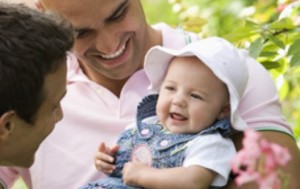 SAN RAMON, Calif. – In 2016 Reproductive Science Center (RSC) reported a significant uptick in LGBTQ in-vitro fertilization (IVF) cycles. Last year marked a 34 percent increase in cycles from 2015 and a 46 percent increase from 2014. For six straight years, in fact, RSC has seen its LGBTQ patient numbers rise by double-digit percentages as more and more individuals and couples seek fertility treatment to realize their dream of starting a family.
SAN RAMON, Calif. – In 2016 Reproductive Science Center (RSC) reported a significant uptick in LGBTQ in-vitro fertilization (IVF) cycles. Last year marked a 34 percent increase in cycles from 2015 and a 46 percent increase from 2014. For six straight years, in fact, RSC has seen its LGBTQ patient numbers rise by double-digit percentages as more and more individuals and couples seek fertility treatment to realize their dream of starting a family.
The 2015 United States Supreme Court ruling that legalized same-sex marriage nationwide marked a significant victory in a long struggle for LGBTQ couples seeking equal legal recognition. More quietly, advances in reproductive medicine have made it easier than ever for these couples to have biological children.
In the case of gay couple Andrew Pentecost and his husband Leon Etchepare who visited RSC several years ago, IVF with preimplantation genetic testing made it possible for them to each fertilize a donor egg and transfer the two viable embryos into their surrogate carrier. In August of 2015 they became the proud fathers of a baby girl and boy delivered via twin pregnancy.
“We both shared a desire to experience the joy of children and the completion of our family,” Pentecost explains. “We talked about adopting and finally settled on surrogacy because it was the best fit for our family. The gift of perspective and watching them learn all about the world and themselves is the most priceless thing I have ever received.” When asked about the awareness of these types of treatments among the LGBTQ community, Pentecost was optimistic.
“From my micro perspective of the world, I believe there is much more awareness than even five years ago,” he explains. “However, I also believe that my experiences in California afford me more exposure and access than many other parts of the world.”
RSC’s Dr. Evan Rosenbluth worked with Andrew, Leon and their surrogate carrier throughout the entire process. He says RSC seeks out patients like Andrew and Leon as a result of an intentional and enduring commitment to serve this diverse and unique patient population.
“RSC offers non-judgmental services to all patients,” says Rosenbluth “We have an entire team dedicated to third party reproduction, an in-house egg donation program and we offer emotional support and counseling services. Getting to take care of the LGBTQ community makes me especially proud. This is a historically underserved and discriminated group within the medical establishment, especially when it comes to reproductive rights.”
Intentional and nonjudgmental communication appears to be a linchpin for providing quality medical care to the LGBTQ community. A 2001 study published in The Journal of the Gay and Lesbian Medical Association found that nearly one third of gay and lesbian primary care patients – 30 percent – declined to discuss their sexual orientation with their provider, and 47 percent of those withheld that information out of concern for poor medical treatment. In the same study, a mere 29 percent reported that they were asked about their orientation during their visit.
Dr. Rosenbluth says that providing individualized, quality treatment for his patients involves asking important questions to identify their needs.
“Each patient has his or her own specific definition, goals and desires on how to build a family,” he explains. “With my LGBTQ patients that often involves back and forth discussions on how I can adapt fertility treatments to work with their particular needs and goals. That conversation is very intimate and I often find myself forging close bonds with my patients. This is unbelievably rewarding.”
As 2017 unfolds, RSC hopes to break its LGBTQ patient record for a seventh consecutive year by continuing its commitment to creating an environment in which LGBTQ patients feel welcomed, heard and cared for. The clinic approaches 35 years of service to the Bay Area and shows no signs of slowing down in efforts to serve all patients needing medical help starting a family.











